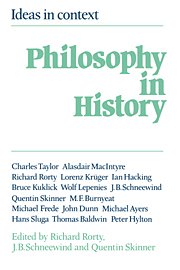Book contents
- Frontmatter
- Contents
- Dedication
- Preface
- Notes on contributors
- Introduction
- PART I
- PART II
- 10 The sceptic in his place and time
- 11 The sceptic's two kinds of assent and the question of the possibility of knowledge
- 12 The concept of “trust” in the politics of John Locke
- 13 Berkeley and Hume: a question of influence
- 14 Frege: the early years
- 15 Moore's rejection of idealism
- 16 The nature of the proposition and the revolt against idealism
- Index
10 - The sceptic in his place and time
Published online by Cambridge University Press: 03 December 2009
- Frontmatter
- Contents
- Dedication
- Preface
- Notes on contributors
- Introduction
- PART I
- PART II
- 10 The sceptic in his place and time
- 11 The sceptic's two kinds of assent and the question of the possibility of knowledge
- 12 The concept of “trust” in the politics of John Locke
- 13 Berkeley and Hume: a question of influence
- 14 Frege: the early years
- 15 Moore's rejection of idealism
- 16 The nature of the proposition and the revolt against idealism
- Index
Summary
Nowadays, if a philosopher finds he cannot answer the philosophical question ‘What is time?’ or ‘Is time real?’, he applies for a research grant to work on the problem during next year's sabbatical. He does not suppose that the arrival of next year is actually in doubt. Alternatively, he may agree that any puzzlement about the nature of time, or any argument for doubting the reality of time, is in fact a puzzlement about, or an argument for doubting, the truth of the proposition that next year's sabbatical will come, but contend that this is of course a strictly theoretical or philosophical worry, not a worry that needs to be reckoned with in the ordinary business of life. Either way he insulates his ordinary first order judgements from the effects of his philosophizing.
The practice of insulation, as I shall continue to call it, can be conceived in various ways. There are plenty of philosophers for whom Wittgenstein's well-known remark (1953:124), that philosophy ‘leaves everything as it is’, describes not the end-point but the starting-point of their philosophizing. There are many who accept one or another version of the idea that philosophy is the analysis or, more broadly, that it is the meta-study of existing forms of discourse – an idea going naturally with the thought that, while a certain amount of revision may be in order, in general philosophy must respect and be responsive to these forms of discourse in the same way as any theory must, in general, respect and be responsive to the data it is a theory of.
- Type
- Chapter
- Information
- Philosophy in HistoryEssays in the Historiography of Philosophy, pp. 225 - 254Publisher: Cambridge University PressPrint publication year: 1984
- 47
- Cited by



